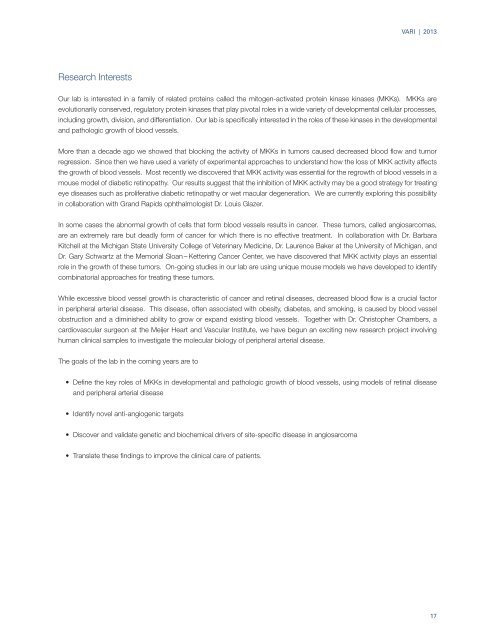2013 Scientific Report
You also want an ePaper? Increase the reach of your titles
YUMPU automatically turns print PDFs into web optimized ePapers that Google loves.
VARI | <strong>2013</strong><br />
Research Interests<br />
Our lab is interested in a family of related proteins called the mitogen-activated protein kinase kinases (MKKs). MKKs are<br />
evolutionarily conserved, regulatory protein kinases that play pivotal roles in a wide variety of developmental cellular processes,<br />
including growth, division, and differentiation. Our lab is specifically interested in the roles of these kinases in the developmental<br />
and pathologic growth of blood vessels.<br />
More than a decade ago we showed that blocking the activity of MKKs in tumors caused decreased blood flow and tumor<br />
regression. Since then we have used a variety of experimental approaches to understand how the loss of MKK activity affects<br />
the growth of blood vessels. Most recently we discovered that MKK activity was essential for the regrowth of blood vessels in a<br />
mouse model of diabetic retinopathy. Our results suggest that the inhibition of MKK activity may be a good strategy for treating<br />
eye diseases such as proliferative diabetic retinopathy or wet macular degeneration. We are currently exploring this possibility<br />
in collaboration with Grand Rapids ophthalmologist Dr. Louis Glazer.<br />
In some cases the abnormal growth of cells that form blood vessels results in cancer. These tumors, called angiosarcomas,<br />
are an extremely rare but deadly form of cancer for which there is no effective treatment. In collaboration with Dr. Barbara<br />
Kitchell at the Michigan State University College of Veterinary Medicine, Dr. Laurence Baker at the University of Michigan, and<br />
Dr. Gary Schwartz at the Memorial Sloan – Kettering Cancer Center, we have discovered that MKK activity plays an essential<br />
role in the growth of these tumors. On-going studies in our lab are using unique mouse models we have developed to identify<br />
combinatorial approaches for treating these tumors.<br />
While excessive blood vessel growth is characteristic of cancer and retinal diseases, decreased blood flow is a crucial factor<br />
in peripheral arterial disease. This disease, often associated with obesity, diabetes, and smoking, is caused by blood vessel<br />
obstruction and a diminished ability to grow or expand existing blood vessels. Together with Dr. Christopher Chambers, a<br />
cardiovascular surgeon at the Meijer Heart and Vascular Institute, we have begun an exciting new research project involving<br />
human clinical samples to investigate the molecular biology of peripheral arterial disease.<br />
The goals of the lab in the coming years are to<br />
• Define the key roles of MKKs in developmental and pathologic growth of blood vessels, using models of retinal disease<br />
and peripheral arterial disease<br />
• Identify novel anti-angiogenic targets<br />
• Discover and validate genetic and biochemical drivers of site-specific disease in angiosarcoma<br />
• Translate these findings to improve the clinical care of patients.<br />
17

















